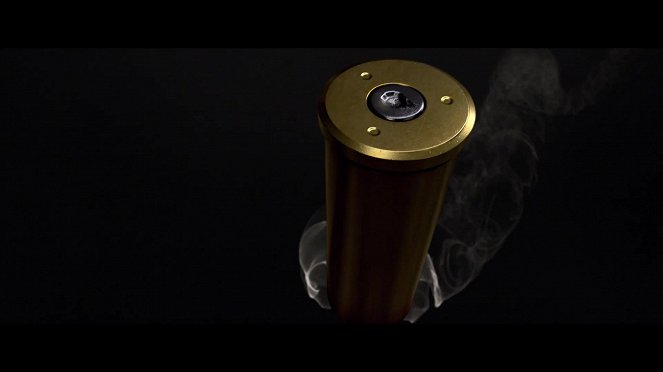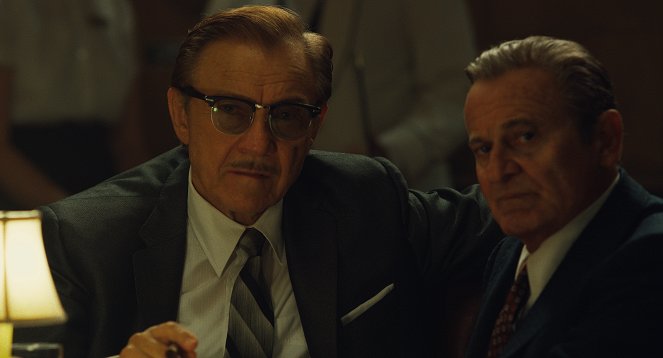Director:
Martin ScorseseGuión:
Steven ZaillianCámara:
Rodrigo PrietoMúsica:
Robbie RobertsonReparto:
Robert De Niro, Al Pacino, Joe Pesci, Bobby Cannavale, Harvey Keitel, Ray Romano, Stephen Graham, Anna Paquin, Stephanie Kurtzuba, Jack Huston (más)Streaming (1)
Sinopsis(1)
Una saga épica sobre el crimen organizado en Estados Unidos durante la época de la post-guerra, vista a través de los ojos del veterano de la Segunda Guerra Mundial, Frank Sheeran, un buscavidas y asesino a sueldo que trabajó junto a algunas de las figuras más notables del siglo XX. A través de varias décadas, la película relata uno de los grandes misterios sin resolver de la historia americana, la desaparición del legendario líder del sindicato, Jimmy Hoffa, y ofrece un viaje a través de los entresijos del crimen organizado: su funcionamiento interno, rivalidades y conexiones con las principales corrientes políticas. (Tripictures)
(más)Videos (7)
Reseñas (16)
Una película de sindicatos contra el gobierno en la América de los años 70 no me llama, precisamente. Pero el brío de la narración y la atractiva descripción del mundo de la mafia la convierten en una obra maestra casi tan grande como Uno de los nuestros. Además, aquí estamos mucho más arriba, entre los escalones más altos de la mafia estadounidense de la época. A De Niro lo que más le cuesta es la cara artificial de joven con ojos de viejo, en la primera mitad hay que acostumbrarse a lo digital. Interpreta a su asesino de la manera tradicional que ya conocemos de papeles similares. Pacino es más original, encarnando a Hoffa de forma excéntrica, con entusiasmo político, enorme orgullo y las más puras intenciones morales del grupo. La actuación más destacada de la película. Para mí el mayor placer fue Pesci, un tipo tranquilo que decide sobre la vida y la muerte de otros. Desde un apático loco con cuchillos (Uno de los nuestros) hasta un jugador mega-influyente con un talento para el ajedrez mafioso, en el que todos los bandos pueden confiar. Bravura en cada escena. Keitel tiene un espacio mínimo, pero en el personaje de uno de los capos más respetados de la época. Son formas de hacer del director, que se hacen aún más evidentes al repetir el visionado. La escena culminante, que hiela la sangre, está respaldada no por una música emocionante sino por un diálogo absurdo sobre peces. El metraje no importa en absoluto, esta «road-movie» es todo un placer nostálgico del estilo único de Scorsese y de sus legendarias interacciones actorales, como no veremos en otra película.
()
Una pieza monumental de cine, con su abrumadora enormidad, Martin Scorsese está enviando un mensaje a los espectadores de Netflix para que dejen el teléfono durante unas horas y presten toda su atención a su obra, que lleva mucho tiempo gestándose, y para que sepan comprender bien la psicología de los personajes, que es de lo que se trata. De una trilogía imaginaria formada por Uno de los nuestros, Casino, El irlandés, la tercera es la más política y la menos brutal, pero no por ello menos impresionante y fatal. Un segundo visionado es obligatorio.
()
I’m sorry, but with this film I have the same problem as with almost every gangster movie focused exclusively on the mobsters. When the efforts of detectives or courts to break the gang get some space (like in this year’s The Traitor or in Scorsese’s The Departed), I’m fine with it, but I hate to watch the fates of characterless, arrogant assholes whose actions, though not directly glorified by the film language, are presented as something cool that should “entertain” the viewers. More so when the main character, besides not having any character, also lacks any interesting qualities; and more so when it has an unreasonable four-hour long run. The Irishman is well made, I guess, and it will satisfy the fans of mafia opuses, but I couldn’t get anything out of it. The plot wasn’t interesting (moreover, despite a number of flashbacks, the conclusion is very predictable), I couldn’t even find any formal pearls, because, other than the digital deageing (that works so-so), there aren’t any. I didn’t find a single interesting scene that could be somehow formally attractive. In short, I only watched it out of respect for the gentlemen behind it, thanks to which, the last hour and a half or so is a little more interesting than the rest. But, even though I subscribe to the words that Scorsese addressed at Marvel, the sad truth is that I would rather watch again the last Avengers than The Irishman.
()
There isn’t a more suitable and meaningful ending to one era of directors like Martin Scorsese and actors like Robert De Niro, Al Pacino, Joe Pesci or Harvey Keitel. It was really nice that all of the above mentioned had a chance to say farewell to the gangster-movie genre with a movie like The Irishman. Nowadays, gangster movies are rare. But as one of the few directors, Martin Scorsese has a patent to such movies, and therefore he precisely knew what he was doing. And of course he pulls you in and doesn’t let go. Still, 209 minutes is 209 minutes. Moreover, same parts are very nostalgic and melancholic, which had to be taken into consideration. The theme is good, but not good enough for me to rate it with 5 stars, as there had been more essential pieces of this genre in the past. Moreover, this movie brought a novelty – digital alteration and rejuvenation of some actors – which takes some getting used to and always makes me lament that it is not possible to stop the flow of time. I really like those actors so for me to see the differences in their appearance wasn’t something I wanted to see. According to my expectations, The Irishman is a good movie. Maybe a bit too classical for a gangster-movie genre with little action and way too long, but it brings you back to the era that all of those who watched The Irishman partly out of nostalgia simply liked.
()
When, after roughly two hours, The Irishman stops switching between the two narrative lines and three different time planes that together set the film’s rhythm, it becomes clear that the wedding was not actually the primary destination of Frank’s journey. At the same time, one important character from Frank’s past comes into the road-movie framework. Contrary to the custom of accelerating the pace as the end approaches, the film slows down and becomes more focused, no longer engaging in a series of diversions and jumping between numerous people and events. We realise that the memory of a given event is of fundamental importance for Frank and he wants to recount it in as much detail as possible, step by step, minute by minute. Thanks to the context provided by the previous two hours, we concurrently comprehend what this is leading to and what the individual characters are experiencing. We start to understand that Frank had merely been carrying out another one of his missions, which usually ends with a house getting painted. ___ In the first narrative line, Frank is in the final phase of his life, just before his death. In the other, he is heading toward death. It seems that all of the events in his life involve death and dying in some way. The detached approach to killing well demonstrates Scorsese’s departure from the more dynamic style of his earlier mafia films. In The Irishman, violence is not “cool”; sometimes we don’t even see it, we only hear it from a distance. If an upbeat song is playing in the car during one of the murders, that is only because the driver turned on the radio to drown out the death rattle of the strangled victim. ___ Frank's blackened conscience, a reminder of his sins and the incompatibility of violent behaviour with the feeling of having a safe home, is represented by his daughter Peggy, thanks to whom we realise that Frank fills his emotional emptiness with words and diverts attention from his inner self to the outside. Though Frank’s relationship with his daughter may seem to be of secondary importance in the context of a story in which people die, cars explode and mobsters bribe top politicians, it is that relationship which best describes how Frank feels and what he longs for above all else: to go out into the world reconciled with himself and with his loved ones. Despite first appearances, the core of the film thus does not represent Frank’s involvement in the structures of the Italian-American mafia and trade unions, but what he lost due to his career advancement. Civil dialogue and time spent in the family circle appear to be more important than a detailed description of the underworld and a factual depiction of Frank’s work processes. Rather than an epic mafia saga, The Irishman is primarily an intimate drama about dysfunctional relationships and the constant presence of death, the basis of which we always carry within ourselves (as we realise thanks also to digitally rejuvenated acting veterans). 95%
()



Anuncio